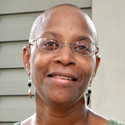Living
Queery: Shirley Hayden
20 questions for the lesbian author

The coming out process took unexpected turns for lesbian author Shirley Hayden. The 50-year-old Lexington, Ky., native told her mother at age 9 she was gay, a proclamation that was met with near indifference. Hayden, who had little social context for being gay in the South, eventually married a man as a young woman and had twin sons. But she quickly realized the straight married life wasn’t for her.
“I just didn’t like it,” she says. “There was something inside of me that it just didn’t work. And it’s not that I hate men. I love men and have many wonderful men in my life. I just didn’t like being married to one.”
Eventually the same adage she brought to her writing career — “I don’t believe in fear,” she says — enabled her to roll with the punches in other areas. She’d never had a conversation with her young sons about being a lesbian but realized they knew what was going on by the time they were in kindergarten. Caught unexpected by show and tell one day because the teacher changed the day, they shared with the class that their mother was gay. She chuckles at the memory now but says it brought unsettling aspects with it. A cousin who was in their class used an anti-gay slur in reference to Hayden to her sons.
“It’s amazing,” she says. “This baby could barely spell his name and he knows words like that? What kind of hatred are we teaching?” Hayden, as always, found refuge in her writing. Inspired by two teachers when she was in seventh grade, she had a small poetry collection published at age 12. She’s since written 11 more books in various genres and is conducting a series of writer’s workshops for LGBT authors every Saturday through the end of the month at lesbian-owned Sisterspace and Books (3717 Georgia Ave., N.W.; www.sisterspacedc.com).
She discovered the shop during a visit to see author/teacher Nikki Giovanni here a few years ago and fell in love with the store because it gave shelf space to writers of color. Her current project is a screenplay called “The Women of Nelson,” which is set in a Civil War-era Army camp in Kentucky (www.shirleyhayden.us). Hayden works as a consultant and grant writer when she’s not doing her own writing. She enjoys spending time in libraries, volunteering, walking, running, Sudoku and sunbathing in her spare time. She also enjoys hearing her now-27-year-old sons’ perspectives on politics and the world. She’s single and lives in D.C.’s Ft. Lincoln neighborhood in Northeast.
How long have you been out and who was the hardest person to tell?
I have never had a problem telling anyone that I am a lesbian. I have been out since age 9. Funny story; I would come home from spending the summers at my grandmother’s every year and tell mama that I was gay. She would respond, “That’s nice, go out and play with your brothers and sisters.” When I turned 18 I just stopped talking about it. At that point she asked if I was still gay. My response was that I was, but I felt she was just going to tell me to go outside and play anyway. And incidentally, I am one of 13 children, born to the same mother and father, and I have two gay brothers as well.
Who’s your gay hero?
Audre Lorde, Terri Jewell, May Sarton, Sapphire, and Alice Walker, Grace Paley, Adrienne Rich are my “sheroes.”
What’s Washington’s best nightspot, past or present?
My favorite D.C. hotspot is actually Sisterspace Books but we need to work on their Wi-fi connectivity. I love meeting writers in the D.C. public libraries to write as well. Libraries across the USA have always been my safe places to write. I have logged more hours in libraries across the country than most people have logged through volunteerism. Additionally, my favorite hotspot is my porch, nachos at LACE, and Busboys and Poets on 5th and K.
What’s your dream gay wedding?
I want to marry in the District. I so want to get married as soon as possible, but my challenge is I cannot marry by myself. My ideal dream wedding would be somewhere on water, but how many watersheds do we have in D.C.? I see myself married, happy, barefoot, but never pregnant. I want to wake up to her morning breath, share night sweats, wear her slippers when traveling, curl up and read together, pray together and do our own particular “nasty” together.
What non-gay issue are you most passionate about?
I would respond racism, but it is certainly a gay issue as well. And so are sexism, volunteerism and mentoring. Well maybe the role of women in the church. Oh wait, I guess that intersection could be homophobia. OK, so my answer will be historical: “I am sick and tired of being sick and tired.”
What historical outcome would you change?
Well Barrack Obama is in the White House, but I think I would continue to change the notion of being “the first anything based upon race, gender or creed or orientation, you know the infamous clause we still use.
What’s been the most memorable pop culture moment of your lifetime?
Most memorable would be the Jackson 5 and oddly, the death of Michael.
On what do you insist?
I insist on being un-bossed and un-bought. Shirley Chisholm, a woman who ran for president back in 1972 — she’s the one who coined that term. Always lived by that philosophy.
What was your last Facebook post or Tweet?
My last Facebook post was in celebration of my newest book, “Coming Out Loud.”
If your life were a book, what would the title be?
“Adam Can’t Take This Rib Back”
If science discovered a way to change sexual orientation, what would you do?
I would pray that I never encountered this science because I like being a lesbian woman; however I would like to tinker with the machinery long enough to eradicate racism, sexism and homophobia.
What do you believe in beyond the physical world?
I always say that, “when hell freezes over, I will skate.” I believe in a lot of things beyond this world but I believe heaven is right here on earth and I believe also in the continuance of it beyond this world.
What’s your advice for LGBT movement leaders?
I have no issues with LGBTQ leaders, however my advice would be to follow. To get behind the movement and push/motivate/inspire/teach/train new leadership to be the forefront.
What would you walk across hot coals for?
I would not walk across hot coals for anything. But I might be encouraged to dance along the edges if I had the opportunity to meet my future mate and life partner.
What gay stereotype annoys you most?
My response will probably inspire debate, discussion, formalization of a nation think tank, new ad-hoc committees and I am sure a few pies thrown in my face, but the stereotype that most annoys me is the women, who bleed like all women, but who believe they are somehow “boys” like my brothers. They are not and I do not care what in the hell they wear in support of trying to be boys or men. Walking like a duck don’t make you a duck.
What’s your favorite gay movie?
People who know me know that one of the areas in which I need to improve is media, particularly movies and even watching TV. Up until about a year ago I did not own a TV and now I am sometimes viewed as the sistah from another planet because movies now in my purview are 10 to 20 years old now. But in answer to the question, I do not think I have a favorite gay movie. The jury is still out on that one.
What’s the most overrated social custom?
This is a hot button topic for me. I think the most overrated social custom is returning text messages every time one of my friends texts me to say they are going to the bathroom. I just do not care and do not want to know about it. I guess if they have fallen off the side of a mountain and they text for help then I may be able to make an exception. But I would expect for them to call 911 for assistance. I get text messages while I am in church. I guess it is telling on me that I allow them to indulge in this behavior with me. Perhaps after today, I will receive fewer messages. I should hope. Additionally, I just do not enjoy Facebook and Twitter for the same reasons. I guess we should hold an all-day summit to address that.
What trophy or prize do you most covet?
I long to win literary awards such as the Pulitzer, but I will settle for more honorable mentions in a new sub-culture where people do not appear to read as much anymore.
What do you wish you’d known at 18?
I wish I had known at 18 that the Internet was coming. I would not have saved so many paper files and newspapers.
Why Washington?
Because I grew up in a farming community and there was no bus and town was where you went on Sunday for church. I have lived in many places, but I live in D.C. because I love, love, love being surrounded by so many diverse people and cultural events. There is always something to do in the District.

Did you melt like the Wicked Witch of the West this week?
As summer temperatures rise, keeping your home or apartment cool during a heat wave can become both a comfort issue and a financial challenge. One of the most effective ways to keep a home cool is to prevent heat from entering in the first place. Sunlight streaming through windows can significantly raise indoor temperatures. Consider the following solutions:
• Close blinds or curtains during the hottest parts of the day. Blackout curtains or thermal drapes can reduce heat gain by up to 30%.
• Install reflective window films to block UV rays and reduce solar heat without sacrificing natural light.
• Use outdoor shading solutions such as awnings (yes, the ones you removed because they were “dated”) and shutters to limit direct sunlight.
Fans are a cost-effective way to circulate air and create a wind-chill effect that makes rooms feel cooler.
• Ceiling fans should rotate counterclockwise in the summer to push cool air down.
• Box fans or oscillating fans can be placed near windows to pull in cooler evening air or push hot air out.
• Create a cross-breeze by opening windows on opposite sides of your home and positioning fans to direct airflow through the space.
• For an extra cooling effect, place a bowl of ice or a frozen water bottle in front of a fan to circulate chilled air.
To optimize natural ventilation, open windows early in the morning or late in the evening when outdoor temperatures drop. This allows cooler air to flow in and helps ventilate heat that built up during the day.
Appliances and electronics generate a surprising amount of heat. To reduce indoor temperatures:
• Avoid using the oven or stove during the day; opt for no-cook meals, microwave cooking, or grilling outside.
• Run heat-producing appliances like dishwashers and clothes dryers in the early morning or late evening.
• Unplug electronics when not in use, as even standby power can add heat to your space.
• Switching to energy-efficient LED lightbulbs can also reduce ambient heat compared to incandescent lighting.
If you do use an air conditioner, maximize its effectiveness by:
• Setting it to a reasonable temperature—around 76–78°F when you’re home and higher when you’re away.
• Cleaning or replacing filters regularly to maintain airflow and efficiency.
• Sealing gaps around doors and windows to prevent cool air from escaping. (Didn’t we all have a parent who said, “Close the door. You’re letting all the cool out?”)
• Using a programmable thermostat to optimize cooling schedules and reduce energy use.
If it is not cost-prohibitive, adding insulation in attics and walls can greatly reduce heat transfer. Solar panels that reflect heat can also help, as well as offset the cost of their installation. Adding weatherstripping around doors and windows, sealing cracks, and using door sweeps can make a significant difference in keeping heat out and cool air in.
Natural and eco-conscious methods can also help cool your home.
• Snake plants, ferns, or rubber trees can improve air quality and slightly cool the air through transpiration.
• White or reflective roof paint can reduce roof temperatures significantly.
• Cooling mats or bedding can make sleeping more comfortable without cranking up the A/C.
For renters or those who can’t make permanent modifications, there are still plenty of ways to keep cool.
• Use portable fans and A/C units instead of built-in systems, making sure they are the correct size for your space.
• Removable window film or static cling tinting can reflect heat without violating your lease.
• Install tension rod curtains or temporary blackout panels instead of hardware-mounted window coverings.
• Add draft blockers and weatherstripping tape that can be applied and removed without damage.
• Cover floors with light-colored rugs to reflect heat rather than absorb it.
• If allowed, use temporary adhesive hooks to hang reflective materials or light-filtering fabrics over windows.
Even if your space is warm, you can still take steps to help your body stay cool.
• Wear light, breathable fabrics like cotton or linen.
• Stay hydrated and avoid caffeine or alcohol during peak heat hours.
• Take cool showers or use damp cloths on your neck and wrists to bring your body temperature down.
Keeping your home or apartment cool in the summer doesn’t have to be expensive or energy-intensive. With a few adjustments such as blocking sunlight, optimizing airflow, using fans effectively, and making renter-friendly upgrades, you can create a more comfortable indoor environment while keeping energy bills in check.
Valerie M. Blake is a licensed Associate Broker in D.C., Maryland, and Virginia with RLAH @properties. Call or text her at 202-246-8602, email her at DCHomeQuest.com, or follow her on Facebook at TheRealst8ofAffairs.
Real Estate
The world’s on fire and D.C. is on sale (sort of)
Prices are up, but then again, nothing makes sense anymore

ICE is disappearing people, revered government agencies are shuttering, and who knows if we’ll be in World War III next week? But can you believe prices in D.C. are actually still up 6.3% since last year? It doesn’t make sense, and perhaps that does make sense, because nothing seems to make any sense any more.
That said, there are some parts of our market that are truly suffering. The interest rates, which have been up, up, up for about four years now, are the ongoing rain on our market’s military parade. Combine that with 75,000 federal employees taking a buyout nationwide, and DOGE cuts eliminating around 40,000 federal jobs in the District (per estimates by the D.C. CFO), not to mention thousands of other job losses in non-governmental organizations due to funding and program cuts, and you’ve got a case of uncertainty, and downright unaffordability in the pool of otherwise would-be buyers.
This has had a marked impact on properties that starter-home buyers and low- to mid-level employees would otherwise buy, most notably condominium and cooperative apartment units. These properties have already slowed in our market thanks to the profound impact that higher interest rates have had on their monthly carrying costs—pair that with job insecurity, and a lot of condos are proving to be very difficult to sell indeed.
So how is the average sale price up in our market?
The increase is almost entirely due to the resounding strength of the single-family home market, especially in upper Northwest D.C., where it is still quite common to see bidding wars, even on properties pushing past the $3M mark. It seems that buyers in that echelon are less impacted by a few percentage points in the interest rate, and less concerned about their job security. Notably, those buyers are often married with children and have an absolute need for more space, must stay in the area due to one spouse’s job, or the kid’s friend group, regardless of whether the cost of owning is thousands of dollars more per month than it would have been in 2020 or 2021. The continued appreciation in these neighborhoods defies imagination.
So, what to do if you are not one of those lucky enough to be shopping for a $3M home? The short answer: wait. If you want more space, rent your current place out and learn the joys of being a landlord while someone else pays your mortgage. Need the equity from your current home to buy your next place? Get a home equity line of credit, or loan, and pull the equity out of your current place to buy the next one. Or—and I have never recommended this before in 21 years of being a Realtor—rent for a few years. Sure, I’d love to list and sell your condo so you can climb the real estate ladder, but it might just be a waste of time, money or both if you could just ride out this storm and sell in a DOGE-less future.
All this said, there are some condos that seem to be immune from this recent negative news. Anecdotally, it feels like it’s the truly special ones that do just fine no matter the market. Our recent listing in Capitol Hill had a view from every one of its 15 windows of the Supreme Court. Sold in five days with six offers. Another condo was on the top two floors of a townhouse and had the coolest black wood floors that gleamed like a grand piano. Sold in four days at full price.
So, all is not for naught if you have a condo or home in an area that people want to be in, with nice space, light, amenities and a certain je ne sais quois. And, as long as we have a democracy in a few years, my experience says our market will be back, stronger than ever, really soon.
David Bediz is a Realtor and mortgage loan broker for the Bediz Group LLC and Home Starts Here, LLC. Reach him at [email protected].

In this corner, there’s the Genesis QV70, newly updated and full of glitzy gizmos. And in the opposing corner, there’s the Lexus NX, a fan fave known for comfort and reliability.
Both are strong contenders. Both have proven to be equally adept at bobbing and weaving through traffic. And both can go toe to toe with pricier competitors.
And yet, what would happen when they sparred against each other? Here’s your ringside seat to find out.
GENESIS QV70

$50,000
MPG: 22 city/28 highway
0 to 60 mph: 5.9 seconds
Cargo space: 28.9 cu. ft.
PROS: Stylish. Good value. Lots of standard amenities.
CONS: So-so fuel economy. Quirky dash controls.
IN A NUTSHELL: When it comes to speed, the Genesis QV70 is faster on its feet than the Lexus NX. Neither of these crossover SUVs is a lightweight, but the QV70 offers more potent powerplants—including an all-electric version that zips from 0 to 60 mph in just 3.8 seconds. In other words, Porsche Macan S territory.
The two gas-powered options—a four-cylinder turbo and twin-turbo V6—also got my blood pumping. So did the velvetlike suspension mixed with deft handling and stop-on-a-dime braking. But this adrenaline rush comes at a cost: sacrificing fuel economy.
As for the automaker’s design philosophy—“athletic elegance”—it’s on full display here: an oversized grille inspired by the Genesis emblem, the dramatically arcing silhouette, and those distinct quad headlights and taillights. It’s not easy to stand out when 25% of all vehicles sold in the U.S. are compact crossovers, so kudos to the QV70 for being such a head-turner.
The mod-yet-minimalist styling carries over to the cabin, with its high-quality materials: real-wood accents, soft-touch plastics and a tasteful glass shift knob. New this year is a sweeping 27-inch dashboard monitor, which houses the gauge cluster and infotainment touchscreen. Alas, this display is positioned a bit far from the driver (though I must admit reaching for it did help stretch a few tight back muscles).
Instead of being a costly extra, this gigantic monitor comes standard. So do synthetic leathers seats, nine-speaker stereo, smartphone/wireless connectivity, hands-free liftgate, tons of safety gear and more. Options include a panoramic sunroof, three-zone climate control, 16-speaker Bang & Olufsen audio, synthetic suede headliner, sound-reducing rear windows, automated parking and other goodies.
What’s the score so far? Despite some minor quibbles, the Genesis QV70 is a worthy challenger that pulls no punches.
LEXUS NX

$43,000
MPG: 26 city/33 highway
0 to 60 mph: 8.2 seconds
Cargo space: 22.7 cu. ft.
PROS: Fuel efficient. Comfy seats. Rock-solid reliability.
CONS: Pokey base model. Limited rear storage.
IN A NUTSHELL: Sure, the Lexus NX isn’t as speedy as the Genesis QV70. But, as with the tortoise and the hare, sometimes slow and steady wins the race. And really, it’s only the entry-level NX that feels sluggish, such as when trying to quickly merge into freeway traffic.
Other trim levels, including two hybrid options, are just fine. And no matter the engine choice, the counterpunch here is that these vehicles get better gas mileage: 20% higher fuel economy than in either the four-cylinder or V6 in the Genesis. The two NX hybrids are even more green, with the high-end plug-in version able to travel up to 37 miles on electric power alone. One downside: There is no all-electric NX—well, at least not yet.
As with parent-company Toyota, Lexus offers stellar vehicle reliability—often ranked No. 1 in dependability and crash-test surveys year after year. Lexus vehicles generally hold their value better than Genesis, because this newer brand has a shorter history. Lexus also has a larger dealer network, though the number of Genesis dealerships is growing.
But when it comes to cargo space, the NX is about two inches shorter and narrower than the QV70, which has more stowage area. And Genesis handling is sportier, though the Lexus feels sure and well-grounded.
Luxe interior amenities are basically the same in both vehicles. But interior styling in the QV70 is trendy, while the NX is more understated. In other words, a choice between sassy and classy.
This is a very competitive vehicle segment, with Euro models like the Audi Q5, BMW X3 and Mercedes GLC also duking it out in what seems like a clash of the titans.
But as for the Genesis QX70 or Lexus NX, which is the winner? For me, both are real knockouts—so I’d call it a draw.
-

 U.S. Supreme Court4 days ago
U.S. Supreme Court4 days agoSupreme Court upholds ACA rule that makes PrEP, other preventative care free
-

 U.S. Supreme Court4 days ago
U.S. Supreme Court4 days agoSupreme Court rules parents must have option to opt children out of LGBTQ-specific lessons
-

 Television5 days ago
Television5 days ago‘White Lotus,’ ‘Severance,’ ‘Andor’ lead Dorian TV Awards noms
-

 Music & Concerts5 days ago
Music & Concerts5 days agoBerkshire Choral to commemorate Matthew Shepard’s life






